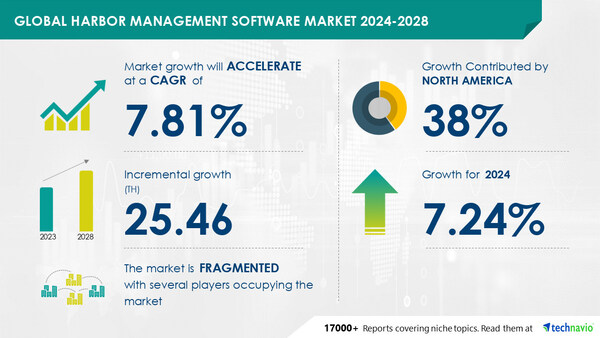News provided byTechnavio
Sep 25, 2024, 17:30 ET
NEW YORK, Sept. 25, 2024 /PRNewswire/ — Report on how AI is redefining market landscape – The Global Harbor Management Software Market size is estimated to grow by USD 25.46 million from 2024-2028, according to Technavio. The market is estimated to grow at a CAGR of almost 7.81% during the forecast period. Growing adoption of cloud-based harbor management software is driving market growth, with a trend towards emergence of digitalization and IOT integration However, lack of training in harbor management software poses a challenge – Key market players include Accel KKR, DockMaster, George James Software Ltd., Harba ApS, Harbour Assist, Harbour Mastery Inc., Havenstar MMS Ltd., J.F. Brennan Company Inc., James Fisher and Sons Plc, Leonardo Spa, Marina Master, Mission Critical Software LLC, Nautical Software Solution, Online Mooring LLC, Pacsoft International Ltd., Saab AB, Scribble Software Inc., Tallykey AS, TPG Marine Enterprises LLC, and Wartsila Corp..

Key insights into market evolution with AI-powered analysis. Explore trends, segmentation, and growth drivers- View the snapshot of this report
| Harbor Management Software Market Scope | |
| Report Coverage | Details |
| Base year | 2023 |
| Historic period | 2018 – 2022 |
| Forecast period | 2024-2028 |
| Growth momentum & CAGR | Accelerate at a CAGR of 7.81% |
| Market growth 2024-2028 | USD 25.46 th |
| Market structure | Fragmented |
| YoY growth 2022-2023 (%) | 7.24 |
| Regional analysis | North America, Europe, APAC, Middle East and Africa, and South America |
| Performing market contribution | North America at 38% |
| Key countries | US, UK, Japan, China, and Italy |
| Key companies profiled | Accel KKR, DockMaster, George James Software Ltd., Harba ApS, Harbour Assist, Harbour Mastery Inc., Havenstar MMS Ltd., J.F. Brennan Company Inc., James Fisher and Sons Plc, Leonardo Spa, Marina Master, Mission Critical Software LLC, Nautical Software Solution, Online Mooring LLC, Pacsoft International Ltd., Saab AB, Scribble Software Inc., Tallykey AS, TPG Marine Enterprises LLC, and Wartsila Corp. |
Market Driver
The harbor management software market is witnessing a notable trend with the integration of digitalization and IoT technology. This shift is transforming how ports and maritime operations are managed. Real-time data collection from IoT sensors deployed across ports and vessels is driving this trend. Data on vessel movements, cargo handling, weather conditions, environmental parameters, and equipment performance is gathered. Harbor management software utilizes this data to deliver valuable insights, enabling informed decisions regarding resource allocation, vessel scheduling, and maintenance activities. IoT sensors on port assets and vessels monitor their condition and performance, predicting maintenance needs and reducing downtime. Additionally, IoT devices and sensors enhance port safety and security by detecting unauthorized access, intrusions, and potential hazards. Harbor management software incorporates these security features, ensuring comprehensive monitoring and response capabilities. Digitalization and IoT integration are expected to fuel market expansion throughout the forecast period.
Harbor management software is a vital tool for the maritime business, enhancing operational efficiency and reducing costs for import/export firms, cargo carriers, and new ports. With the rise of free trade agreements, containerization transport, and emission laws, the need for effective harbor management software is more crucial than ever. The software helps manage policies related to conflict zones, freight security, and sea routes, ensuring compliance and safety. Digital transformation is a significant trend in the harbor management software market, with AI and big data playing essential roles. Operational cost savings, shipyard productivity, and supply chain operations are key benefits. Environmental impact is also a consideration, with cybersecurity measures essential to protect ship management data from cyber attacks. Moderate competition exists among software providers, offering on-premise and cloud deployment modes to cater to various business sizes, from SMEs to large transportation services. Additional features include vessel tracking, ship broker services, and warehouse management systems, integrating cargo information and digital technologies to streamline operations. Boatyards, marinas, boat dealers, and maritime surveillance are also served by this software market.
Request Sample of our comprehensive report now to stay ahead in the AI-driven market evolution!
Market Challenges
- Harbor management software plays a crucial role in optimizing the operations of ports and terminals. However, the implementation of this technology in enterprises can be intricate, necessitating extensive user training. This training process can delay the extraction of essential information, thereby decreasing harbor efficiency. Developing countries, such as China and Brazil, face challenges in adopting harbor management software due to a shortage of trained personnel. Moreover, local vendors in these regions are often unaware of the software’s benefits and lack the expertise to maximize its potential usage. Consequently, the scarcity of skilled professionals is a significant barrier to the growth of the harbor management software market during the forecast period.
- The Harbor Management Software market faces moderate competition from various players offering solutions for warehousing, vessel tracking, ship brokers, digital transformation, and supply chain operations. Boat yards, marinas, and boat dealers also utilize these systems for managing their productivity and workforce. Cargos and shipping logistics are key focus areas, with global supply chains requiring real-time cargo information and transportation services. Environmental impact is a growing concern, driving the adoption of digital technologies like AI and Big Data. Cybersecurity measures are essential to protect ship management data from cyber attacks. Deployment modes include On-Premise and Cloud, catering to both SMEs and large enterprises. Additionally, crew management, harbor and port management, reservation management, and warehouse management systems are integral parts of this market.
Discover how AI is revolutionizing market trends- Get your access now!
Segment Overview
This harbor management software market report extensively covers market segmentation by
- End-user
- 1.1 SMEs
- 1.2 Large enterprise
- Deployment
- 2.1 On-premises
- 2.2 Cloud
- Geography
- 3.1 North America
- 3.2 Europe
- 3.3 APAC
- 3.4 Middle East and Africa
- 3.5 South America
1.1 SMEs- Harbor management software is an essential tool for Small and Medium Enterprises (SMEs) in the maritime industry. This software streamlines operations, minimizing manual paperwork and administrative tasks, leading to cost savings through improved resource allocation and overall efficiency. Real-time information on vessel arrivals, departures, berth availability, and cargo handling enhances customer service, resulting in increased satisfaction and repeat business. Data-driven decision-making is crucial, and software collects and analyzes operational data, enabling informed decisions, optimized routes, and planned maintenance. Scalability and flexibility are vital as SMEs grow. Mobile access ensures responsiveness and agility in the dynamic maritime industry. Additionally, safety and security are enhanced with access control and surveillance integration. The industry’s growing focus on environmental sustainability is addressed through optimized routes, reduced idle times, and managed fuel consumption. These benefits promote SME growth, driving the harbor management software market’s expansion during the forecast period.
Download a Sample of our comprehensive report today to discover how AI-driven innovations are reshaping competitive dynamics
Research Analysis
Harbor management software plays a crucial role in the maritime business by streamlining operations for import/export firms, cargo carriers, and new ports. This software enhances operational efficiency and reduces costs through real-time tracking of shipments, automation of processes, and optimization of containerization transport. New free trade agreements and emission laws necessitate the digital transformation of harbor management, making it essential for supply chain operations, shipyard productivity, and workforce management. Containerized transport, shipping logistics, and global supply chains benefit from harbor management software, which also considers the environmental impact of maritime activities. AI and big data are integral to modern harbor management systems, enabling predictive maintenance, cybersecurity measures against cyber attacks, and improved communication between stakeholders. Additionally, boatyards, marinas, boat dealers, and ship management data can also be managed through these advanced systems.
Market Research Overview
Harbor management software plays a crucial role in the maritime business by streamlining operations for import/export firms, cargo carriers, and new ports. This software enhances operational efficiency and reduces costs through real-time cargo tracking, vessel scheduling, and automation of administrative tasks. New ports and free trade agreements expand the market, while containerization transport, emission laws, and policies pose challenges. Digital transformation, supply chain operations, and shipyard productivity are key areas of focus. Sea routes, maritime surveillance, and freight security are essential aspects of harbor management software. Moderate competition exists among software providers, with offerings including crew management, harbor and port management, reservation management, and warehouse management systems. Digital technologies such as AI, big data, and cybersecurity measures are increasingly important in this market. The market caters to both SMEs and large enterprises, with deployment modes including on-premise and cloud solutions. Other applications include boatyards, marinas, boat dealers, ship management data, transportation services, and digital technologies for shipbrokers. Environmental impact, crew management, and ship management data are critical concerns for stakeholders.
Table of Contents:
1 Executive Summary
2 Market Landscape
3 Market Sizing
4 Historic Market Size
5 Five Forces Analysis
6 Market Segmentation
- End-user
- SMEs
- Large Enterprise
- Deployment
- On-premises
- Cloud
- Geography
- North America
- Europe
- APAC
- Middle East And Africa
- South America
7 Customer Landscape
8 Geographic Landscape
9 Drivers, Challenges, and Trends
10 Company Landscape
11 Company Analysis
12 Appendix
About Technavio
Technavio is a leading global technology research and advisory company. Their research and analysis focuses on emerging market trends and provides actionable insights to help businesses identify market opportunities and develop effective strategies to optimize their market positions.
With over 500 specialized analysts, Technavio’s report library consists of more than 17,000 reports and counting, covering 800 technologies, spanning across 50 countries. Their client base consists of enterprises of all sizes, including more than 100 Fortune 500 companies. This growing client base relies on Technavio’s comprehensive coverage, extensive research, and actionable market insights to identify opportunities in existing and potential markets and assess their competitive positions within changing market scenarios.
Contacts
Technavio Research
Jesse Maida
Media & Marketing Executive
US: +1 844 364 1100
UK: +44 203 893 3200
Email: media@technavio.com
Website: www.technavio.com/
SOURCE Technavio

